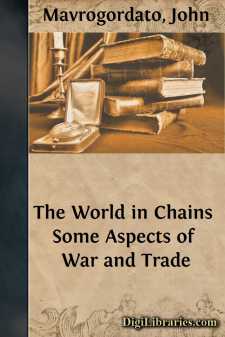Categories
- Antiques & Collectibles 13
- Architecture 36
- Art 48
- Bibles 22
- Biography & Autobiography 813
- Body, Mind & Spirit 142
- Business & Economics 28
- Children's Books 12
- Children's Fiction 9
- Computers 4
- Cooking 94
- Crafts & Hobbies 4
- Drama 346
- Education 46
- Family & Relationships 57
- Fiction 11828
- Games 19
- Gardening 17
- Health & Fitness 34
- History 1377
- House & Home 1
- Humor 147
- Juvenile Fiction 1873
- Juvenile Nonfiction 202
- Language Arts & Disciplines 88
- Law 16
- Literary Collections 686
- Literary Criticism 179
- Mathematics 13
- Medical 41
- Music 40
- Nature 179
- Non-Classifiable 1768
- Performing Arts 7
- Periodicals 1453
- Philosophy 64
- Photography 2
- Poetry 896
- Political Science 203
- Psychology 42
- Reference 154
- Religion 513
- Science 126
- Self-Help 84
- Social Science 81
- Sports & Recreation 34
- Study Aids 3
- Technology & Engineering 59
- Transportation 23
- Travel 463
- True Crime 29
The World in Chains Some Aspects of War and Trade
Categories:
Description:
Excerpt
The Massacre of Colleagues
The existence of war in the modern world is primarily a question for the moral philosopher. It may be of interest to the anthropologist to consider war as a gallant survival with an impressive ritual and a code of honour curiously detached from the social environment, like the Hindu suttee; or with a procedure euphemistically disguised, like some chthonic liturgy of ancient Athens. But it is a problem too broad for the anthropologist when we consider that we have reached a stage of civilisation which regards murder as the most detestable of crimes and deprives the murderer of all civil rights and often even of the natural right to live: while in the same community the organised massacre of our colleagues in civilisation is not only tolerated but assumed to be necessary by the principal expositors of law and religion, is the scientific occupation of the most honoured profession in the State, and constitutes the real sanction of all international intercourse.
The Widening Sphere of Morality
The existence of war stimulates the astonished watcher in the tower of ivory to examine the development, if any, of human morality; and to formulate some law of the process whereby political man has been differentiated from the savage.
Morality being a relation between two or more contracting parties, he will notice that the history of mankind is marked by a consistent tendency to extend this relation, to include in the system of relationships more numerous and more distant objects, so that the moral agent is surrounded by a continually widening sphere of obligations.
This system of relationship, which may be called the moral sphere, has grown up under a variety of influences, expediency, custom, religious emotion and political action; but the moral agents included in it at any given time are always bound to each other by a theoretical contract involving both rights and duties, and leading each to expect and to apply in all his dealings with the others a certain standard of conduct which is approximately fixed by the enlightened opinion of the majority for the benefit of the totality.
The moral sphere then is a contractual unit of two or more persons who agree to moderate their individual conduct for their common good: and the State itself is only a stage in the growth of this moral unit from its emergence out of primitive savagery to its superannuation in ultimate anarchy, commonly called the Millennium. The State indeed is a moral sphere, a moral unit, which has long been outgrown by enlightened opinion; and the trouble is that we are now in a transition stage in which the boundaries of the State survive as a limitation instead of setting an ideal of moral conduct.
The Receding God
I don't know that it is necessary to drag God into the argument. But if you like to regard God as the sanction and source of morality, or if you like to call the moral drift in human affairs God, it is possible to consider this "Sphere of Morality" from His point of view....


